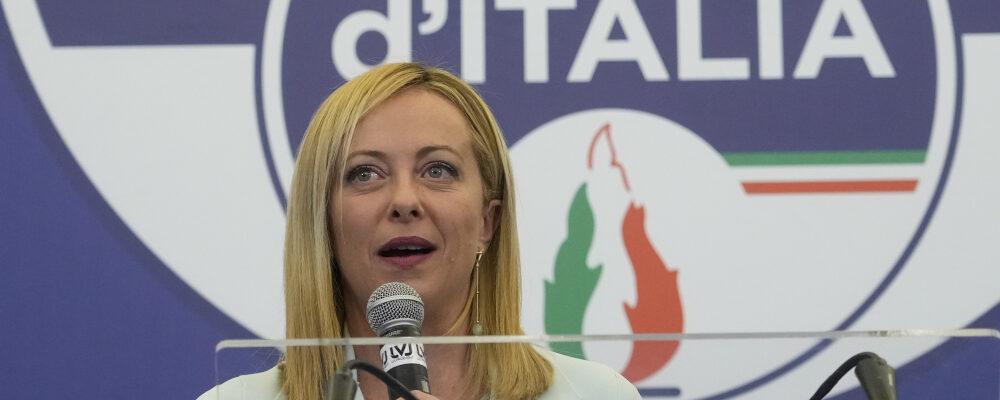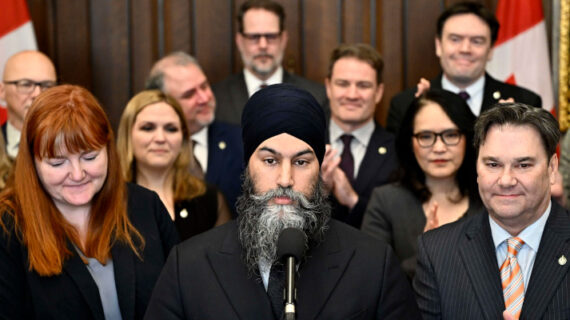Last Sunday, the Italians did something they hadn’t done since Benito Mussolini was appointed prime minister by King Victor Emmanuel III in 1922. They elected a right-wing coalition with Giorgia Meloni as the leader of the largest party, the Brothers of Italy, Fratelli d’Italia, a name taken from the country’s national anthem. She’ll also be Italy’s first woman prime minister.
To understand how this came to be, it’s essential to grasp Italy’s history with Mussolini.
When writer Yascha Mounk, in a recent article in The Atlantic, was travelling in Tuscany, he noticed gas stations selling cigarette lighters with images of Mussolini; he was appalled. He shouldn’t have been. Statuettes and calendars of Mussolini are common in train stations throughout the country. One can find Second World War paraphernalia as standard fare at any open market, next to the provolone and balsamic vinegar. Benito’s face even shows up on wine bottles.
Italians have a different sense of taste when it comes to the subject of fascism. We are shocked by open displays romanticizing fascist figures. What is expected in Italy would jolt a German to see commercial pictures of Hitler. Italians don’t see it that way. Fascist symbols blend into the cultural background. Many Italians seet Il Duce as a well-meaning nationalist, even a buffoon, and more victim than victimizer who made the tragic mistake of allying Italy with its historical enemy. That’s why Italians feel comfortable voting for a party that carries the symbols of Italy’s fascist past, signs that may be tasteless but not frightening. After the election of Silvio Berlusconi in 1994, Italians were well past the stage of bad taste and kitsch in Italian politics.
Italians weren’t voting for a return to fascism. The Brothers of Italy is just another anti-establishment party similar to Berlusconi’s Forza Italia or Beppi Grillo’s Five Star Movement that won power in the last decade. Both parties promised prosperity and were punished for their failures. Now it’s Giorgia Meloni’s turn to try and right the ship of state. Not only are Italians a hopeful lot, they also have a thing about voting against traditional parties, such as the politically moderate Democratic Party, which won only 19 percent of the vote. Once called the Christian Democrats, they ruled Italy for decades after 1950. The scent of favouritism and corruption from those years still lingers.
It’s important to understand that there are two Melonis. First is the politician from a working-class section of Rome who grew up immersed in right-wing politics railing against the EU, the Euro, uncontrolled immigration, and adoption by gays. Meloni makes no excuses for her animosity towards Islam and supports a Europe with deep roots in its Christian past. In brief, she’s a social conservative that appeals to older Italians. On the political front, Meloni has close ties to illiberal leaders such as Viktor Orban in Hungary and the Freedom and Justice party in Poland. Even the Kremlin congratulated her victory, hoping to bring Rome and Moscow closer together.
Italians voted for the second Meloni, the post-campaign politician who promised to govern for all Italians by stimulating growth and jobs, better social services, and controlling the runaway national debt, now over 150 percent of GDP. Italy is bleeding jobs, especially among young educated workers, for better opportunities abroad. Despite her ties to other right-wing factions in Europe, she remains a loyal supporter of Ukraine and favours strong sanctions against Russia. Most Italians support both. Here she’ll have to watch her back from her two coalition partners, Berlusconi and Matteo Salvini, both apologists for Putin’s war.
Meloni will also have to tone down her rhetoric toward the EU for no other reason than to secure the billions of Euros from the Next Generation EU fund set up to help European countries recover from the COVID-19 pandemic. The next few months will occupy her time getting a budget together by the end of the year, which should keep her mind off social issues for the time being.
If she’s smart, she’ll maintain a strong relationship with Mario Draghi, the recent interim prime minister and former head of the European Central Bank, credited for saving the Euro. The highly respected Draghi did an excellent job nursing Italy’s finances. She should heed his advice.
Meloni would be wise to seek the help of Sergio Mattarella, Italy’s principled and stable president while marginalizing her two partners, Salvini and Berlusconi. They will undermine her power at the first opportunity. Italian politics is a nasty and cruel business. This is the land of the Caesars and the Gracchi Brothers1The Gracchi, Tiberius Gracchus, and Gaius Gracchus, were Roman brothers who tried to reform Rome’s social and political structure. https://www.thoughtco.com/gracchi-brothers-tiberius-gaius-gracchus-112494. You can google them.




